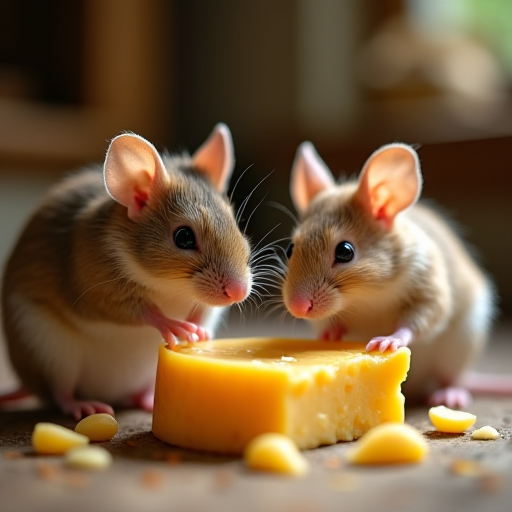
Why Do Mice Like Cheese?
The image of a tiny mouse nibbling on a piece of cheese is an iconic one, popularized by cartoons and media. However, the idea that mice have an inherent preference for cheese is more myth than reality. In this article, we will explore the origins of this stereotype, delve into the dietary habits of mice, and examine whether cheese is truly a favored food for these small rodents.
Origins of the Cheese-Mouse Myth
The association between mice and cheese can be traced back to European folklore and literature. In medieval times, cheese was a staple in the diet of many households. Cheese, being a preserved dairy product, was often stored in cool, accessible places like cellars and pantries. Consequently, it was common for mice, which are opportunistic feeders, to come across and nibble on cheese left out in the open. This led to the perception that mice have a particular fondness for cheese.
The myth gained further traction in the 19th and early 20th centuries with the rise of illustrated books and cartoons, which often depicted mice stealing cheese. These playful depictions cemented the idea in popular culture.
Understanding Mouse Diets
To understand whether mice truly prefer cheese, it’s essential to look at their natural diet. Mice are omnivorous creatures with a highly varied diet. In the wild, they primarily consume:
- Seeds and Grains: These are staples of a mouse's diet, providing essential nutrients and energy.
- Fruits and Vegetables: Mice are attracted to the sugars and moisture content found in fruits and vegetables.
- Insects: As opportunistic feeders, mice will consume insects for protein when available.
In a domestic setting, mice will eat almost anything they can find, including human food scraps. Their dietary choices are driven more by availability than preference.
Do Mice Actually Like Cheese?
Research and observations suggest that cheese is not a preferred food for mice. Several factors contribute to this:
- Smell and Taste: Mice have an acute sense of smell and taste. While they can eat cheese, the strong odor and flavor of certain cheeses might be off-putting to some mice.
- Lactose Intolerance: Like many mammals, mice can be lactose intolerant after weaning. Cheese, especially if consumed in large amounts, can cause digestive issues.
- Nutritional Needs: Cheese does not offer the balanced nutrients that mice seek. They prefer foods that provide a mix of carbohydrates, proteins, and fats.
What Foods Do Mice Prefer?
Given the choice, mice are more likely to be drawn to foods that align with their natural preferences:
- Nuts and Seeds: High in fats and proteins, nuts and seeds are a mouse favorite.
- Fruits and Vegetables: These offer essential vitamins and hydration.
- Grains and Cereals: Easily accessible and nutrient-rich, grains are a staple for mice.
While mice can eat cheese, it is not their first choice, especially when more nutritious options are available.
Conclusion
The idea that mice love cheese is more fiction than fact, rooted in historical context and perpetuated by popular media. Mice are versatile eaters with a preference for foods that meet their nutritional requirements. While they might eat cheese if it's available, it’s not the delicacy it’s often portrayed to be.
Understanding the dietary habits of mice can help in managing and preventing infestations. By knowing what truly attracts these rodents, homeowners can take more effective measures to keep them at bay.
